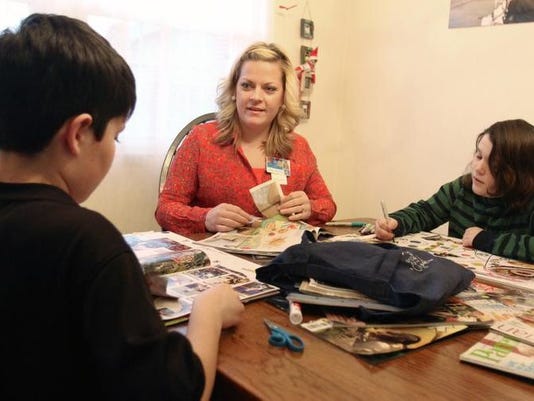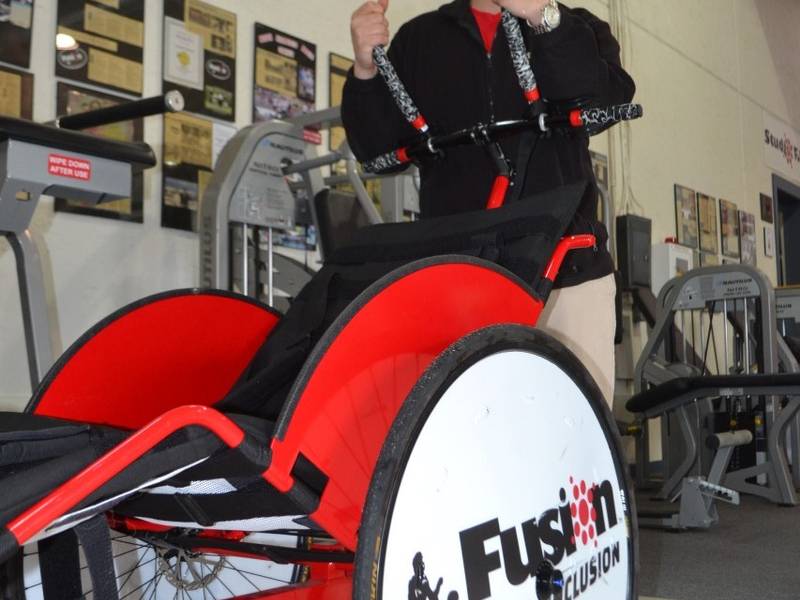Tara Monroe’s car looks like a mobile art project. Inside you’ll find scraps of paper, stickers, glitter and paint, along with scissors, glue and old magazines – kid-friendly supplies she brings to the homes of the children she visits. But there’s more than just arts and crafts.
Monroe, a child life specialist from Nemours/Alfred I. duPont Hospital for Children, uses the power of play to help grieving kids talk about their feelings after losing a brother or sister. She gets down to their level – sometimes, literally – to get a better understanding of where kids are in the grief journey.
“They’re not sick. They don’t need to be at a hospital, so why see them there?” said Monroe, who works in the palliative care program at Nemours. “Sometimes they want to show me everything that’s in their room. They show me pictures. You get this different sense of who they are.”
Kids with Confidence
Monroe’s work is supported by Kids with Confidence, an organization that aims to help children build self-confidence no matter their physical or emotional challenges.
For nearly 10 years, the local, all-volunteer organization has focused on helping kids with physical differences – such as protruding ears, skin growths, scars and other cosmetic deformities – undergo corrective procedures to help them feel better and more comfortable in their own skin.
These operations often are not covered by health insurance or are too costly for families to pay for on their own, said Xavi DeCaire, who founded Kids with Confidence after being involved with Operation Smile, an international organization that helps children with facial deformities.
Over the years, Kids with Confidence has helped fund about 60 procedures, including cochlear implants, otoplasty for ear deformities and gastric banding for those struggling with obesity.
“This is something people don’t talk about,” DeCaire said. “If you can prevent a child from being made fun of because of how they look, that can make a big difference.”
While Kids with Confidence previously focused on issues related to appearance, it’s taking a similar approach in helping kids with the emotional scars related to the death of a sibling. The organization is committing $68,000 over two years to fund Monroe’s part-time position.
“When they described Tara’s position and what she gives to these kids, it took probably three minutes to decide this was something we want to do,” said Dick Christopher, who serves on the Kids with Confidence advisory board and also the Board of Directors of the Nemours Foundation.
‘Emotional scars’ not always visible
Helping grieving siblings is part of the whole family approach to care, seen as instrumental in the pediatric palliative care experience, said Dr. Elissa Miller, director of the Thomas P. Ferry palliative care program at Nemours.
Losing a loved one isn’t easy for anyone, and it can be even harder for siblings who might have been accustomed to being overshadowed by an ill brother or sister. In addition to grieving their deceased sibling, they yearn for a family dynamic that no longer exists.
“These emotional scars aren’t always as visible,” Miller said.
Working with kids in their own home rather than the hospital gives them a chance to more fully express themselves, said Monroe, who is working with five families dealing with sibling loss or an impending death. Children who seemed shy in the hospital while visiting their sibling suddenly blossom with personality.
Through memory books, paintings and other activities, Monroe can gingerly address some of the challenges children might be experiencing.
“The big piece is explaining that I’m not walking in and then talking about emotional things,” she said. “It’s more like, ‘Hi, I’m Tara. Let’s play today.’ ”
Monroe’s work has made a difference for the Dunne family, whose daughter Molly died in 2012 after battling pulmonary hypertension, a lung disorder that eventually causes heart failure. In addition to her parents, Molly left behind a twin sister, Kate, and older brother, Ryan.
“The big thing with Ryan and Kate is that Molly was kind of the boss around here. So they are trying to figure out who is the new boss,” said Kristen Dunne, Molly’s mother. “It’s really changed the dynamic between the two of them. They’ve become close since losing Molly.”
Part of Monroe’s visits include remembrances about Molly, but that’s not the whole focus, Dunne said. The goal is to encourage them to move forward.
Slowly, it’s making a difference, especially for Kate, who has the added struggle of moving forward without the twin sister who once shared everything with her.
“Kate talks about how losing Molly was like losing half of herself, how she doesn’t want to grow up and do things without Molly,” Dunne said. “You want to respect and remember that, but I want Kate to know she can grow up . She doesn’t have to live in Molly’s shadow all the time.”
Contact Kelly Bothum at (302) 324-2962 or kbothum@delaware online.com.
For more info
Kids with Confidence helps children living in Delaware, Pennsylvania, New Jersey and Maryland. It assists children without health insurance or those whose coverage doesn’t include medical procedures.
For more information, visit www.kidswithconfidence.org. To make a donation, contact Delaware Community Foundation at (302) 571-8004 or visit delcf.org.


